September 20. GISENYI/GOMA "Daytrip to the DRC" On Monday we moved on from Ruhengeri to the town of Gisenyi, right on the border with the Democratic Republic of the Congo, on Lake Kivu. After breakfast at the Muhabura we got a taxi into town and jumped into the first van heading to Gisenyi. Our taxi driver hailed the van as it was pulling out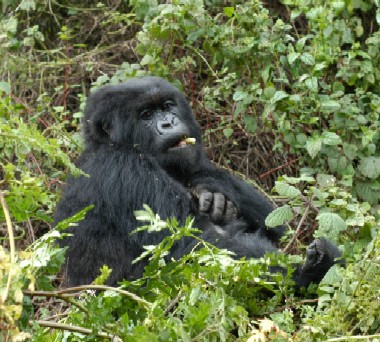 of town so the stopped and picked us up. With a little effort we were able to negotiate a place in the backseat with all of our bags between us. It turned out to be an ideal spot since we were insulated from all of the people who continually got in and out of the van, often. Unlike our ride from Kigali to Ruhengeri where we only stopped once for a man to pee, this van stopped constantly. On a map the distance didn't look very far but it still took two hours to reach Gisenyi. And, each time we stopped we tended to draw attention from bystanders. We learned it was best to slide our windows closed as we came to a stop so we didn't get faces peeking in and kids begging for money. We just tried to look nonchalant but we could hear tapping at the window and people yelling "Muzungu! Muzungu!". Rwandans don't speak Swahili but they have adopted the term "muzungu". One of the times I did leave my window open I heard kissing noises coming from a pair of teenage boys that were squatting down to look in the window as they were hissing "Muzungu!". They were just trying to get my attention but I'll never get used to the different use of that kissing sound. I was hard not to get annoyed. A man in the front of our van kept looking back at me like he was looking out the window but it seemed rather odd to spend so much of the ride looking at where we came from instead of where we were going. I guess we were somewhat of a novelty. of town so the stopped and picked us up. With a little effort we were able to negotiate a place in the backseat with all of our bags between us. It turned out to be an ideal spot since we were insulated from all of the people who continually got in and out of the van, often. Unlike our ride from Kigali to Ruhengeri where we only stopped once for a man to pee, this van stopped constantly. On a map the distance didn't look very far but it still took two hours to reach Gisenyi. And, each time we stopped we tended to draw attention from bystanders. We learned it was best to slide our windows closed as we came to a stop so we didn't get faces peeking in and kids begging for money. We just tried to look nonchalant but we could hear tapping at the window and people yelling "Muzungu! Muzungu!". Rwandans don't speak Swahili but they have adopted the term "muzungu". One of the times I did leave my window open I heard kissing noises coming from a pair of teenage boys that were squatting down to look in the window as they were hissing "Muzungu!". They were just trying to get my attention but I'll never get used to the different use of that kissing sound. I was hard not to get annoyed. A man in the front of our van kept looking back at me like he was looking out the window but it seemed rather odd to spend so much of the ride looking at where we came from instead of where we were going. I guess we were somewhat of a novelty.
The road led us up and down, passing through mostly small villages or past random houses, but we did make one stop at a larger town where we picked up a parcel of chickens. Special baskets were woven to carry chickens. They baskets were about a foot high and maybe four feet square. The weave was very loose so the chickens had plenty of 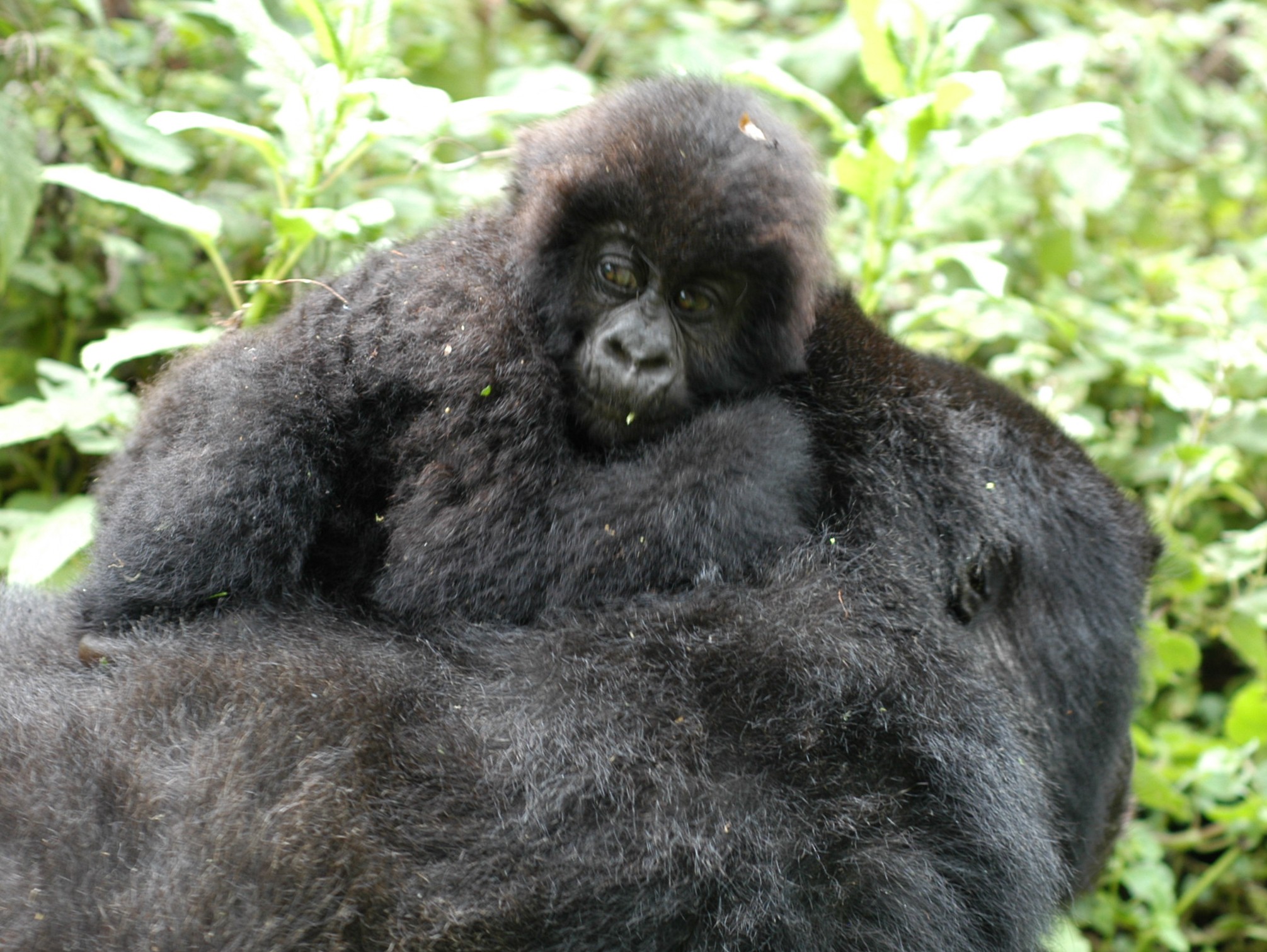 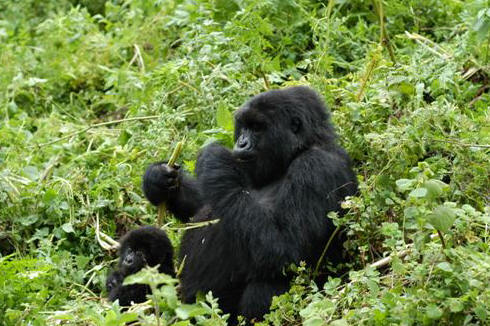 ventilation but it didn't exactly look comfortable. The tied the basket on the roof of the van. A man stepped up on the wheel just outside my window to tie the basket in place. He had an extra pair of chickens that didn't fit in the basket dangling upside down, tied by their feet. When I looked over I saw their sorry little faces squawking for freedom as they were dragged to the roof and tied onto the basket. All of this made it a lengthy stop and several young children were tapping up and down our windows, trying to open them from outside, anything to get our attention for some money. The two chickens that were tied on top ended up flying off on a downhill section of the road. Rob saw them go. Perhaps they survived toss and earned their freedom but in a country as populous as Rwanda they more likely became someone else's dinner. ventilation but it didn't exactly look comfortable. The tied the basket on the roof of the van. A man stepped up on the wheel just outside my window to tie the basket in place. He had an extra pair of chickens that didn't fit in the basket dangling upside down, tied by their feet. When I looked over I saw their sorry little faces squawking for freedom as they were dragged to the roof and tied onto the basket. All of this made it a lengthy stop and several young children were tapping up and down our windows, trying to open them from outside, anything to get our attention for some money. The two chickens that were tied on top ended up flying off on a downhill section of the road. Rob saw them go. Perhaps they survived toss and earned their freedom but in a country as populous as Rwanda they more likely became someone else's dinner.
The road climbed for a while as we went up and over some mountains and then descended via a winding road to Lake Kivu, Africa's highest lake at 1,459 meters. The volcano backdrop was even more stunning than Ruhengeri. The bus station was near the center of town but away from the waterfront hotels in Gisenyi. After sorting out a misunderstanding with our van driver we caught a taxi into town. We had miscalculated our van fare but then he over corrected the fare so it took some moments of charades to sort it out. When the taxi pulled up to the first hotel we planned to check out it was obviously closed. The taxi driver suddenly recollected that as we pulled around the front, as though he didn't know it when we got in the cab? He offered to drive us to a smaller hotel about 100 yards down the road and then tried to double the price on us for the extra distance. It was so obviously a scam that we just brushed him off. He knew we were heading for a closed hotel and he didn't ask for any more money when he offered to take us to the second hotel. We might have given him a little something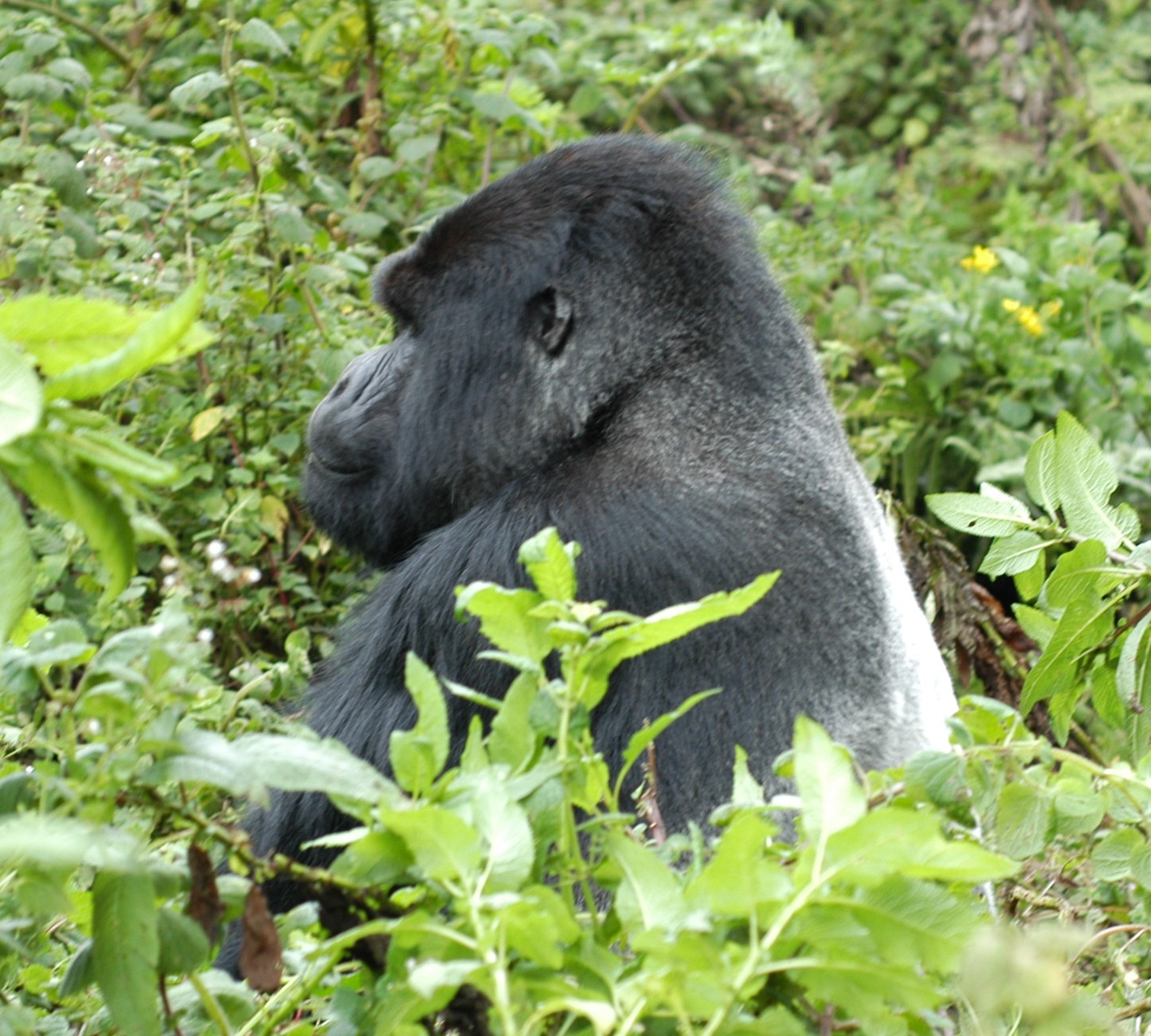 extra for the second stop but when he asked for double the money he priced himself right out a tip. He tried to make a scene and threatened to not unlock the trunk but Rob just grabbed the keys, unlocked the trunk, and we got our bags without looking back. extra for the second stop but when he asked for double the money he priced himself right out a tip. He tried to make a scene and threatened to not unlock the trunk but Rob just grabbed the keys, unlocked the trunk, and we got our bags without looking back.
The second hotel was more of a guest house in an old home, right along the water front. The tree lined beach area blocked our view of the lake but it was just a walk across the street to the water and the whole are was so serene. It just seemed like there were birds everywhere. We were given a corner room on the second floor. It was very roomy and the bathroom was rather rundown, with a broken toilet seat, but overall it was comfortable and even had a TV. Our taxi experience made us feel a bit uneasy. Gisenyi had always been a rather posh getaway for rich Rwandans and tourists but the Congolese rebel problems had put a damper on its popularity. Perhaps some people here were a little too eager to make some money, like our sleazy taxi driver. So, we locked up our bags in the bathroom for safe keeping.
It was still early in the day and we had been planning to visit nearby Goma, just inside the DRC. The area has suffered from Congolese rebel groups, going through periods of being real unsafe, but current reports were that things were okay. Our map didn't show exactly how far it was to Goma from Gisenyi but our hotel told us it would be a $5 taxi ride. That seemed awfully steep so we decided to just figure it out on our own. Walking back to the main road we waited on the corner for a taxi to come by. One never did. We were the only tourists in sight and people gave us casual glances as they walked past. Finally a car stopped. It was just a small blue four-door, not a taxi, but we figured it might be a local person who wanted to pick some extra cash. Rob asked if he was going to Goma and he said yes and told us to hop in the car. Rob took the front passenger's seat and I got in the back. We asked how much he wanted for the ride but he just shook his head. He was going that way anyway and just wanted to give us a 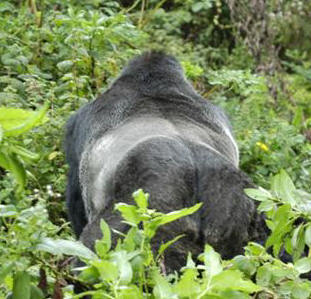 ride. On the seat next to me I noticed a roll of what looked like drafting papers. It appeared that our driver was an architect. His name was Richard. ride. On the seat next to me I noticed a roll of what looked like drafting papers. It appeared that our driver was an architect. His name was Richard.
It turned out that the actual border was only about 500 meters from our hotel, right down the water front. We had to get out of the car for immigration. Most of the traffic going through the border was pedestrian and the immigration office as busy. Leaving Rwanda was easy enough. We just filled out a from, got our stamp and we were on our way. Richard drove us through the no man's zone and we got out again for the DRC immigration check. We had to get a visa for the DRC but Richard helped us get through the process quickly. He went to and from Goma regularly and knew the border officials well.
Once past the border checks we passed a few nice resort hotels that sat along Lake Kivu before the road turned away from the lake, ran straight for a couple kilometers, and hit the middle of Goma but there wasn't a whole lot to the middle of Goma. Richard took us off the main road and past a conspicuously nice little hotel in downtown with UN vehicles parked out front, pointed out a good Indian restaurant, and then looped back to the main road at a large traffic circle. He let us out there and showed us a small shack selling souvenirs on the opposite side of the circle. Rob offered him some money for gas and he offered to come back later to drive us around town a bit more and show us the lava flow. We didn't want to impose upon him but set a time in the afternoon to meet and told we would be there but not to worry if he couldn't make it back.
Goma had a touch of that wild west feeling. Unlike the hills around Gisenyi, Goma was pretty flat with the volcano skyline off in the distance. The town was mostly unpaved with just a couple of roads lined with concrete store fronts. If the weather hadn't been tropical I could have imagined a tumbleweed blowing through town. But a desert did exist, inside the shops. They had very little in the way of inventory to keep up with the customers. Still it was rather remarkable that Goma existed at all. In 2002, the nearby Nyiragongo volcano erupted, displacing 500,000 people, destroying 14 villages and much of Goma. What we were seeing was what was left of Goma.
We drew some attention as we walked around town but nobody made a big deal about us, mostly just the odd hello, friendly nod, or look of curiosity. I left my camera behind to avoid looking obviously like a tourist. There was a steady stream of UN trucks around so people probably assumed we were aid workers. Only one young man followed us into a couple of stores to offer his help. We weren't looking for much in particular so we didn't need his translation services. He was certainly looking for a tip but wasn't persistent when we told we were didn't need any help. It looked like there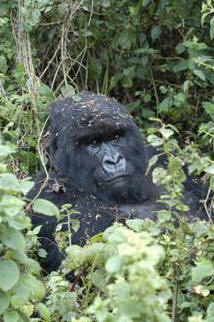 was very little opportunity for work in Goma so we had to respect his resourcefulness. was very little opportunity for work in Goma so we had to respect his resourcefulness.
We noticed a foreign bureau sign on one building and thought it might be a forex place but ended up in the office of a local tour office. Just out of curiosity Rob asked about their gorilla trips and the man was more than happy to help. Goma's volatile situation was really hurting his business. He assured us that it was safe but, in fact, there are still sporadic problems in the area. He lived there and was forced to accept the situation and had gotten used to it. His concept of danger would be quite different than most tourists. Still, for the adventuresome and reckless traveler there were cheaper deals to the see the gorillas in the DRC. A permit cost about $275 but with the added escorts and transportation it was still expensive. With the demand for gorilla permits it was a shame that the Congolese couldn't maximize their tourist opportunity for gorilla visits, for the sake of the people as well as the gorillas.
One of our main interests in visiting Goma was to buy some authentic Congolese art work actually in the Congo. We had seen examples of it as far away as Zanzibar and it was definitely the most interesting artwork in the region. The Congolese people are largely adherents of traditional tribal religions and carved wonderful statues and fetishes out of wood, each tribe with its own style. But, in Goma we found very little in the way of stores catering to tourists. It really just amounted to the wooden shack on the big traffic circle. A group of men had their wares spread out under the flimsy overhang and were all smiles when we came over to take a look. They had some interesting things but it wasn't a large selection. We wanted to buy something to support their business and found some unique wooden bells with fertility 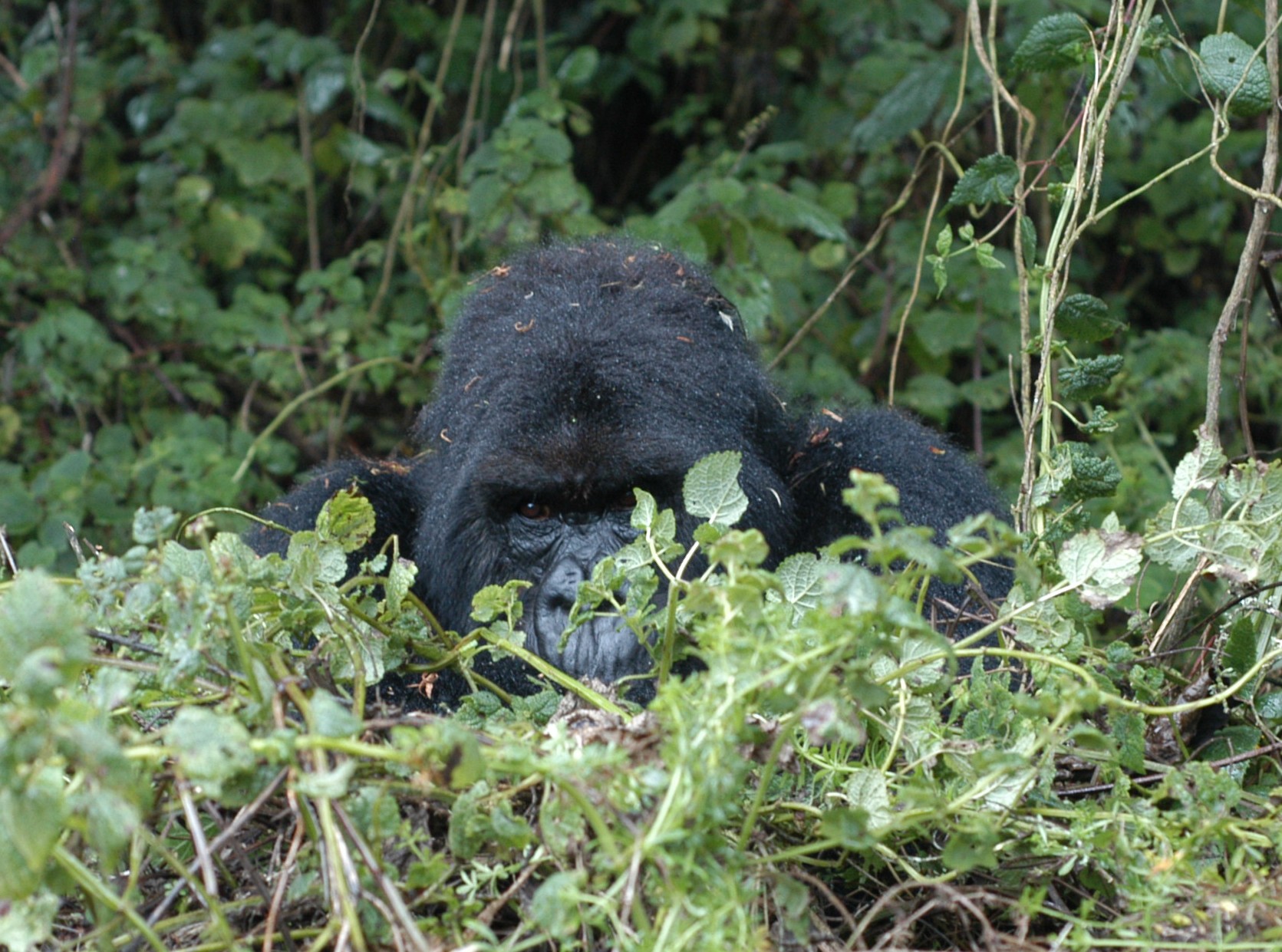 statues carved on the top. With a little negotiation Rob got them to throw a third little statue into the deal and we were all happy. It was good money for them and we had genuine Congolese statues bought in the Congo. statues carved on the top. With a little negotiation Rob got them to throw a third little statue into the deal and we were all happy. It was good money for them and we had genuine Congolese statues bought in the Congo.
Walking through town we came upon two UN workers, South African pilots, who were buying meat from a butcher shop. We stepped inside just to see what was for sale and chatted for a moment. At least the butcher was well stocked. We looked for a cafe to take a rest but didn't find much. There were a couple of grungy little places but we weren't daring enough. In amongst the restaurants and shops were a couple of Internet cafes but we decided to use the snail mail instead, just to prove we'd been to the Congo! We were heading over towards the Indian restaurant that Richard had pointed out to us when we got sidetracked going to the post office.
The Goma post office stood on the large traffic circle. The state of the building made us think it was out of business but upon closer investigation there were people inside. They looked a bit surprised to see us but were very helpful. It was a large drafty place with old wooden boxes for sorting mail along the walls and long wooden tables serving as desks; the most modern thing in the place was electricity and a stapler. We asked if they had post cards. No. We asked if they had any envelopes. No. Our inquiries started to draw a bit of attention from the surrounding offices. The U.N. had its own postal service so it was probably a bit of an event to send international mail from the Goma post office. We had seen handmade note cards at the souvenir stand so we crossed the street to by a couple. By the time we came back it looked like almost every postal worker in the building had gathered around to watch the tourist send their postcards, but that was still only about five people. They all watched while we wrote out our cards, stapled them shut, and addressed the front. It cost one US dollar per card which we were able to pay in US currency. They assured us our cards would make it but we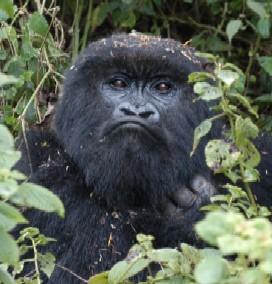 were a bit skeptical. (We later found out that they did make it, with an old Zaire stamp on the front.) were a bit skeptical. (We later found out that they did make it, with an old Zaire stamp on the front.)
After our cards were posted we finally headed over to the restaurant for lunch. There we ran into the only other tourists in Goma that day, James and Lawrence. It was impossible not to acknowledge each other as we walked up the front steps. They were sitting on the porch of the old wooden house with a local guide. We paused and chatted for few minutes. They were also staying in Gisenyi so we decided to meet up for drinks that night. The restaurant had surprisingly good samosas that filled us up and, of course, the ubiquitous Coca-Cola. It was a much needed break.
After lunch we checked out the nearby hotel that appeared to exist just to cater to the UN workers. Stepping off of the dusty road and into the hotel was like changing worlds. In a town that had just the most basic of services this hotel looked like it could have been back home. The lobby was nicely decorated in Congolese art, the restaurant had tables decked with folded cloth napkins, there was a spacious back patio shaded with trees, and a slick bar. The complex stretched out behind the front building with two wings of rooms. At $40/night it was a bargain but the contrast in living standards was shocking.
With more time to kill before we were scheduled to meet Richard we walked down the only other "major" street in Goma's that we hadn't seen. Part way down we came upon a gate painted with the Dian Fossey Gorilla Fund International logo. Curious, we went inside to see if they organized any trips in the DRC or had any Gorilla Fund souvenirs for sale. It seemed unlikely but we had nothing else to do. The man inside was kind enough to talk to us. They were just a research operation, not geared towards tourists. But, he was wearing a commemorative pin with the Gorilla Fund name on it so we asked if they sold the pins. He said he didn't have any but after giving it some thought he said their office near the border would have some.
We were nearing the time when we were supposed to meet Richard so we headed back towards the traffic circle. Rob noticed the sky was starting to get dark and told me to hurry up. Just as we were a block away it started to rain. By the time we reached the little souvenir shack it was pouring. We crowded under the overhang with a group of people and stood to wait it out. It gave us a good excuse to look over their goods again. They casually pointed to one thing or another to perk our interest. We occasionally picked up 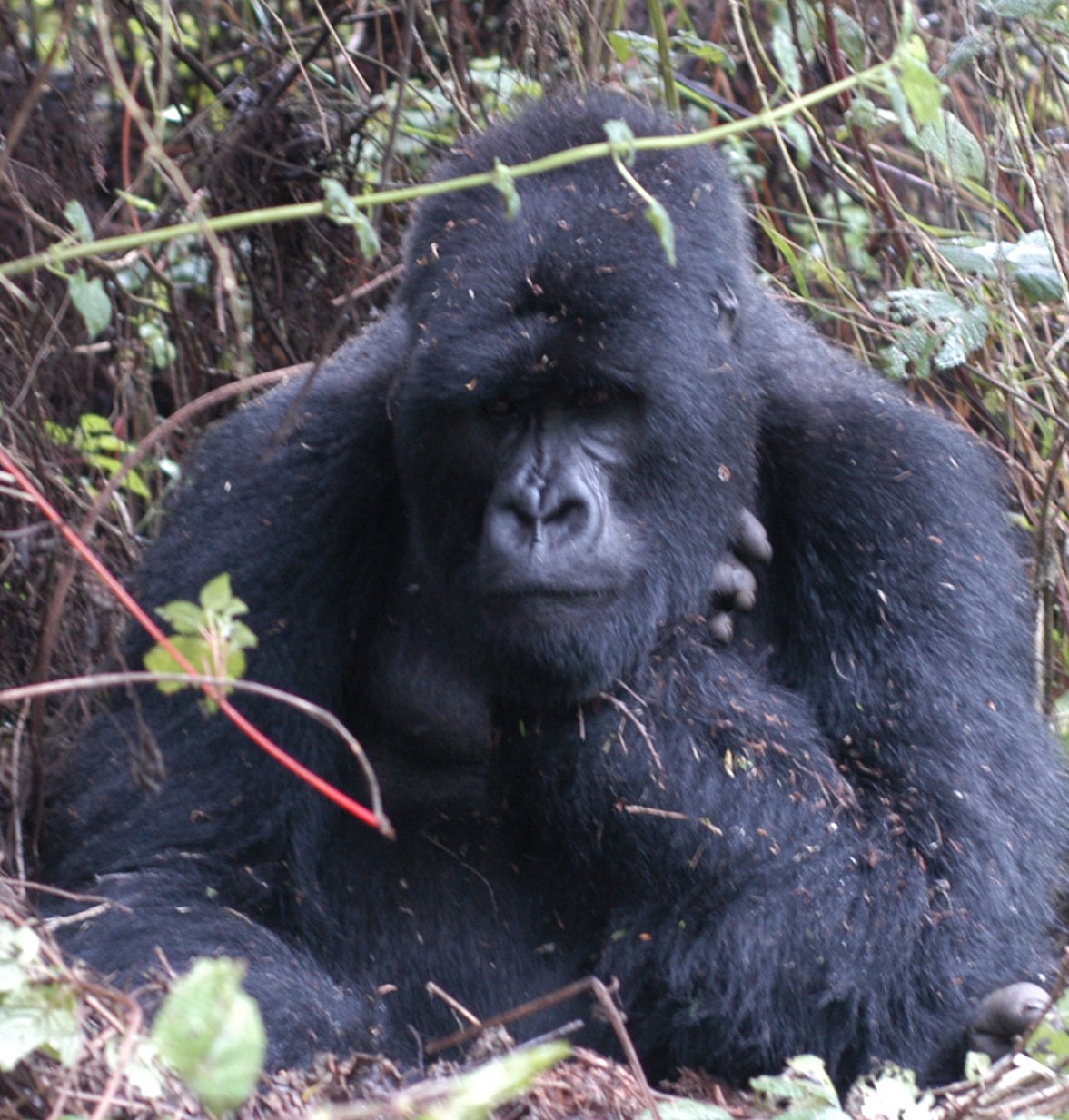 something and took a closer look. It was a sort of dance. When the rain let up people gradually headed off to where ever they had been going in the first place. We had been huddled together for over a half hour which tends to bond people so they waived "good-bye" like we were all old friends. Richard hadn't shown up and we had waited more than a half hour past the scheduled time so we figured he was unable to make it back. Before setting off towards the border we bought one more thing from the souvenir shack; a carved wooden headrest. We'd been going back and forth over it for about fifteen minutes. How badly did we want it? How badly did they want to sell it? It was a test of wills. They eventually met us part way and we bought it. something and took a closer look. It was a sort of dance. When the rain let up people gradually headed off to where ever they had been going in the first place. We had been huddled together for over a half hour which tends to bond people so they waived "good-bye" like we were all old friends. Richard hadn't shown up and we had waited more than a half hour past the scheduled time so we figured he was unable to make it back. Before setting off towards the border we bought one more thing from the souvenir shack; a carved wooden headrest. We'd been going back and forth over it for about fifteen minutes. How badly did we want it? How badly did they want to sell it? It was a test of wills. They eventually met us part way and we bought it.
Since more rain was imminent was grabbed a cab to the border area and asked to be dropped at the Dian Fossey Gorilla Fund office. The driver didn't exactly know where it was and our directions had been vague so we overshot it and ended up wandering around for a while and, of course, it started to rain again. We ended up in one of the nice hotels along the water and asked them if they knew the place. It sounded familiar but they weren't sure. Eventually we saw the painted gate with the giant gorilla painted on it but it was already after 5:00 and it didn't look open. We peeked through the eye holes and knocked on the gate. Someone was inside but we didn't hear anything. We banged a bit louder and eventually someone came out and motioned for us to go around the corner. There we found a smaller gate and a guard let us in. It was just an older house that had been converted into offices and it was rather Spartan. We explained that their other office had directed us there and asked if they sold the Gorilla Fund pins. The man looked perplexed but was friendly. He asked us to wait and disappeared into a back room. Another man was standing a desk nearby. He smiled, we smiled, but it all seemed a bit awkward. When the other man returned he said they didn't have any more pins but invited us to into the back of the house. There we were greeted by a tall American man who headed up the office. He had been living in Goma for years and had seen the city during its worse moments. He didn't advise visiting the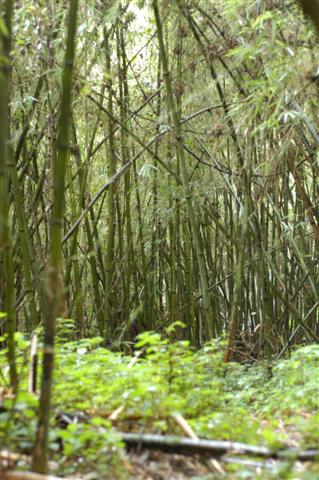 gorillas in the DRC with the current instability. We apologized for interrupting their work since the office clearly wasn't geared towards taking visitors. He told us we were the first tourists they'd ever had visit the office! They must have thought we were mad! After a brief chat we thanked him for his time and headed for the border. For more information on the Dian Fossey Gorilla Fund International go to www.gorillafund.com. gorillas in the DRC with the current instability. We apologized for interrupting their work since the office clearly wasn't geared towards taking visitors. He told us we were the first tourists they'd ever had visit the office! They must have thought we were mad! After a brief chat we thanked him for his time and headed for the border. For more information on the Dian Fossey Gorilla Fund International go to www.gorillafund.com.
On our way to the border we saw Richard's car coming down the road. He pulled over and rolled down the window. His son was in the car with him. He apologized for not being able to get back sooner but we told them we were fine and thanked him again for his help that morning. The checkpoint was just another 50 meters and we had no trouble re-entering Rwanda on foot. The border wasn't far from our hotel so we just walked the rest of the way.
The old house had a nice large porch out front that overlooked the spacious front yard. A tall hedge obscured the road and made it a peaceful place for some rest after our long day. A pair of crowned cranes, Uganda's national bird, lurked along the hedge but when I tried to get close to take a photo they scooted in the opposite direction. I made several attempts but they weren't going to have anything to do with me. They never flew off but kept themselves hidden behind the garden furniture, their yellow feather crowned heads peeking out from time to time.
The hotel had a lonely grey parrot in a cage by the front desk. He repeatedly talked and sang at us but when we got up to go look in his cage he stopped and just gave us a suspicious eye. The only other person on the patio was a single man and we all eventually started to laugh at this character of a parrot. While I went upstairs to get ready for dinner Rob chatted the 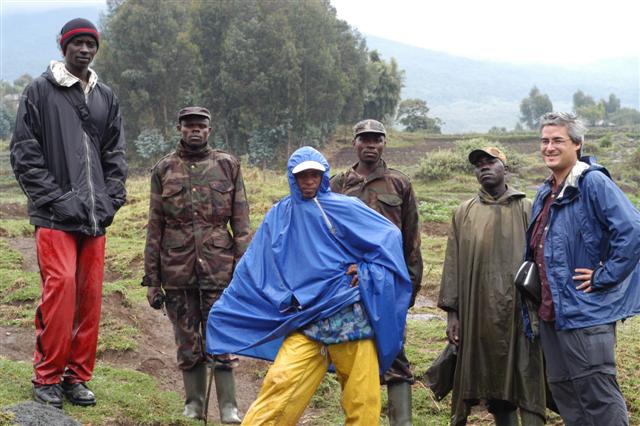 guy up a bit. It turned out he was from Belgium and had come down to visit a friend that was getting married. The friend, also a Belgian man, worked in Kigali and had met an Ethiopian woman. They were getting married in Ethiopia in the next week. This was the bachelor weekend and they were planning to climb one of the nearby volcanoes. guy up a bit. It turned out he was from Belgium and had come down to visit a friend that was getting married. The friend, also a Belgian man, worked in Kigali and had met an Ethiopian woman. They were getting married in Ethiopia in the next week. This was the bachelor weekend and they were planning to climb one of the nearby volcanoes.
Before it got completely dark we left for the Kivu Sun Hotel at the far end of the road. We were meeting James and Lawrence there for drinks but decided to get their early and grab some dinner. The hotel had been through a couple of incarnations but only recently opened as the Kivu Sun, under South African owners. It was a beautiful little hotel with all of the comforts. We ate some delicious and very reasonably priced meals in the bar while we waited for James and Lawrence. When they arrived with their guide we moved to a bigger table. They were an adventuresome pair and we enjoyed exchanging travel stories and learning about their enterprise in West Africa. Both of them had traveled extensively and James, the older of the two, had racked up some 200 countries! Now they lived in The Gambia and ran an exclusive eco-lodge and cultural center called the Makasutu Culture Forest. It was fifteen years of hard work and dedication that has turned into an award winning resort on the Gambia River. They showed us their website from a laptop and for anyone interested in a classy off-the-beaten track holiday destination should check out www.makasutu.com. 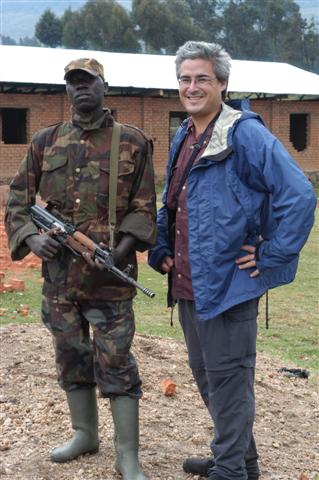 You can get your own floating lodge on the river, exquisitely decorated and completely private! Lawrence also had photos he'd taken in Goma already downloaded onto his laptop. They showed the devastation caused by the lava flows. Cars and entire homes were completely engulfed, frozen into lava that was meters high. It was an absolutely horrible sight. For a region already struggling with so many problems it just seemed so unfair. You can get your own floating lodge on the river, exquisitely decorated and completely private! Lawrence also had photos he'd taken in Goma already downloaded onto his laptop. They showed the devastation caused by the lava flows. Cars and entire homes were completely engulfed, frozen into lava that was meters high. It was an absolutely horrible sight. For a region already struggling with so many problems it just seemed so unfair.
We spent a good two hours talking up a storm with James and Lawrence until the long day just started to show on everyone's faces. During the evening it started to rain. Lightening flashed again and again against the pitch black sky. It was absolutely stunning. Fortunately the rain let up in time for us to walk back to our hotel. The long tree-lined street was dimly lit with street lights and very quiet. It might not have been entirely safe but we tried not to think about it, moved swiftly, and just enjoyed the stillness of the night. |

